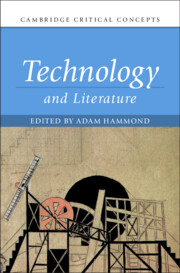Book contents
- Technology and Literature
- Cambridge Critical Concepts
- Technology and Literature
- Copyright page
- Contents
- Figures
- Contributors
- Timeline
- Introduction
- Part I Origins
- Part II Developments
- Chapter 8 Prostheses
- Chapter 9 Clocks
- Chapter 10 Compasses
- Chapter 11 Telescopes
- Chapter 12 Steam Engines
- Chapter 13 Wires
- Chapter 14 Cameras
- Chapter 15 Phonographs
- Chapter 16 Waves and Rays
- Chapter 17 The Bomb
- Chapter 18 Networks
- Part III Applications
- Index
Chapter 10 - Compasses
from Part II - Developments
Published online by Cambridge University Press: 30 November 2023
- Technology and Literature
- Cambridge Critical Concepts
- Technology and Literature
- Copyright page
- Contents
- Figures
- Contributors
- Timeline
- Introduction
- Part I Origins
- Part II Developments
- Chapter 8 Prostheses
- Chapter 9 Clocks
- Chapter 10 Compasses
- Chapter 11 Telescopes
- Chapter 12 Steam Engines
- Chapter 13 Wires
- Chapter 14 Cameras
- Chapter 15 Phonographs
- Chapter 16 Waves and Rays
- Chapter 17 The Bomb
- Chapter 18 Networks
- Part III Applications
- Index
Summary
This chapter deals with literary appropriations of navigation technologies in Early Modern England. It focuses on two kinds of compasses: those that trace circles and those that point to magnetic north. Invented in around 200 BCE in China, the magnetic compass came into use in Europe in the early thirteenth century; by the sixteenth century, metaphorical employments of navigation technologies were widespread in English literature. Barrett reads the literary engagements of John Milton, John Donne, and others with both kinds of compasses to demonstrate how the devices served both to amaze and also to reorient the colonial geographic imagination of early modern readers. As she argues, “With the era of European exploration (and its associated colonial projects), the compass became virtually synonymous, for professional pilots and laypeople alike, with navigation – and wonder.”
- Type
- Chapter
- Information
- Technology and Literature , pp. 199 - 215Publisher: Cambridge University PressPrint publication year: 2023

